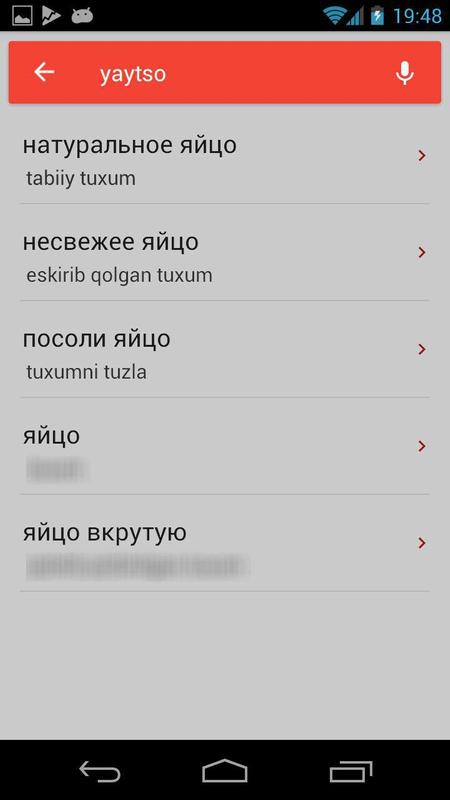Ruscha Uzbekcha Lugat

A B Ch D E F G G‘ H I J K Q L M N O O‘ P R S Sh T U V X Y Z ’ a b ch d e f g g‘ h i j k q l m n o o‘ p r s sh t u v x y z ’ Interesting Facts About Uzbek Language Uzbek is a Turkic language of the Qarluq family in the Altaic group of languages. It is similar to other Turkic languages of Central Asia, particularly Uyghur and Kazakh. Most of the words are Turkic in origin but there also a great many Arabic, Persian, Russian—and in China, Chinese—loan words. In China, Uzbeks have particularly close relations with Uyghurs and Kazakhs. The Uzbek, Uyghur and Tatar languages all belong to same Turkic language branch and are very close to each other. At one time there were only two people in the entire United States who could speak Uzbek.
Uzbeks speak either of two dialects of Uzbek. Uzbek shares many words and grammar structures with Turkish. It developed from Chagatai, a language used in the eastern Turkish world. Although numerous local dialects and variations of the language are in use, the Tashkent dialect is the basis of the official written language.
Google'ning ushbu bepul xizmati so'z, ibora va veb-sahifalarni o'zbek va boshqa 100 dan ortiq tillarga bir zumda tarjima qiladi. Buy English-Russian-Uzbek dictionary =: Inglizcha-ruscha- uzbekcha lughat = Anglo-russko-uzbekskii slovar by I Aloev (ISBN: ) from Amazon's Book Store.
The dialects spoken in the northern and western parts of Uzbekistan have strong Turkmen elements because historically many Turkmen lived in close proximity to the Uzbeks in those regions. The dialects in the Fergana Valley near Kyrgyzstan show some Kyrgyz influence. Especially in the written dialect, Uzbek also has a strong Persian vocabulary element that stems from the historical influence of Iranian culture throughout the region. [Source: Library of Congress, March 1996 *] Uzbek has a relatively short history as a language distinct from other Turkic dialects. Until the establishment of the Soviet republic's boundaries in the 1920s, Uzbek was not considered a language belonging to a distinct nationality.
It was simply a Turkic dialect spoken by a certain segment of the Turkic population of Central Asia, a segment that also included the ruling tribal dynasties of the various states. The regional dialects spoken in Uzbekistan today reflect the fact that the Turkic population of Southern Central Asia has always been a mixture of various Turkic tribal groups. When the present-day borders among the republics were established in 1929, all native peoples living in Uzbekistan (including Tajiks) were registered as Uzbeks regardless of their previous ethnic identity. (Source: factsanddetails.com ).
Ushbu Ruscha-O'zbekcha va O'zbekcha-Ruscha lug'at rus tili yoki o'zbek tilini o'rganuvchi yoshlar, o'quvchilar, talabalar uchun ishlab chiqilgan bo'lib umumiy bazasi 30000 dan oshiq qatorlardan va 50 mingtaga yaqin so'zlardan iborat. Lug'at offlayn tarzda ishlaydi, foydalanish uchun internet shart emas. Lug'atning asosiy imkoniyatlari: - Sodda va intuitiv interfeys - So'zlarga boy offlayn baza - Tezkor qidiruv - Ovozli qidiruv - Qidiruvda imlo xatolarini to'g'irlash - Ro'yhatni tezkor varoqlash - Ro'yhatda shrift o'lchamini sozlash - O'zbek tili uchun lotin va kirill alifbosi - Lotin yozuvida ruscha so'zlarni qidirish Lug'at bo'yicha taklif va mulohazalaringizni kutib qolamiz. ********************** This Russian-Uzbek and Uzbek-Russian dictionary is intended to help Russian or Uzbek language learners. Dictionary includes more than 30K rows and about 50K words. Kodi universaljnogo puljta mac 2008 torrent. Dictionary could be used in offline mode. Main features: - Easy-to-use and user-friendly interface - Huge database of words in offline mode - Fast lookup of words - Voice search - Auto-correction of misspelled words - Quickly scroll through the list - Ability to adjust the font size - Ability to choose Cyrillic or Latin scripts for Uzbek language - Search russian words typing with latin Feedbacks are welcome and appreciated.